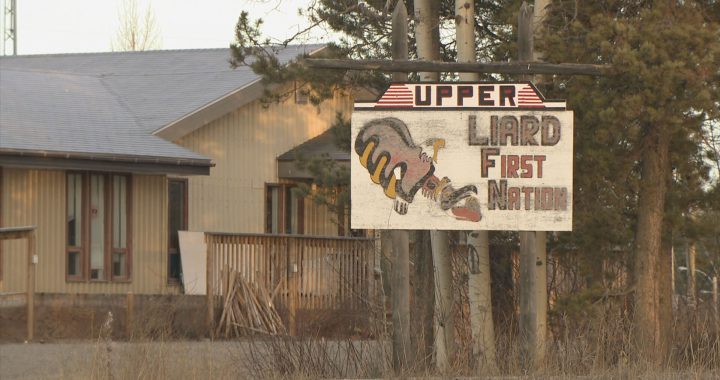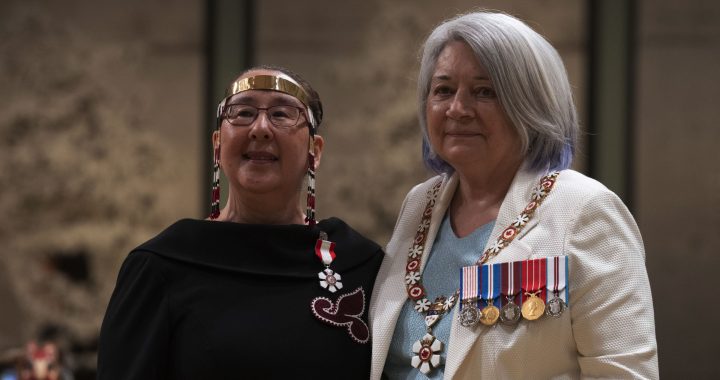Justin Brake
APTN News
Family, friends, and leaders descended upon We’koqma’q First Nation in Cape Breton from all over Mi’kma’ki and beyond Saturday for the funeral of late Sante’ Mawi’omi Grand Chief Ben Sylliboy.
Sylliboy passed away Nov. 30 at the age of 76.
His family, members of his community and Mi’kmaq leaders described the chief as both an ordinary and extraordinary man.
“He was the face of who we are, and now with him being gone I think it leaves a tremendous void,” We’koqma’q First Nation Chief Rod Googoo told APTN News outside Sylliboy’s wake ahead of a procession to the St. Kateri Parish where a funeral mass was held.
“And also he was a wonderful human being too, eh: a good father, good husband, good grandfather, good uncle.”
Assembly of First Nations National Chief Perry Bellegarde travelled from Ottawa to attend the funeral.
He remembered Sylliboy as being “all about unity” and “working together.”
“He was all about rights, treaty rights. He was focusing on nationhood, sovereignty, jurisdiction,” Bellegarde said, describing Sylliboy’s death as a “big loss.”
He left behind a legacy of “creating a better life for Mi’kmaw people, and for all First Nations people.”
Sylliboy was born in We’koqm’a in 1941.
He attended the Indian Residential School in Shubenacadie, Nova Scotia from ages six to 10.
After returning home he battled tuberculosis for 18 months.
In 1968 he was chosen to represent his community as a Keptin on the Mi’kmaq Grand Council.
Two years later, in 1970, he was elected to the We’koqma’q band council, where he served nine terms.
In 1991 Sylliboy was appointed grand chief of the Sante’ Mawi’omi after former grand chief Donald Marshall Sr. passed away.
He served as the Mi’kmaq Nation’s head of state for 25 years until his death. The hereditary position is bestowed only to individuals who embody Mi’kmaq values and demonstrate great honour in their daily lives.
Outside the funeral mass Saturday, his great nephew Christian Phillips described Sylliboy as a “good family man.”
“I didn’t see him as a Chief, I always seen him as Uncle Ben,” Phillips told APTN.
“He was always nice — a nice guy. Loved his Church, loved his community, loved his people.”
Christina “Duce” Sylliboy, one of the late Chief’s two daughters, describer her father as being “all about love.”
A vice-principal at the We’koqma’q Mi’kmaq School, Duce said when she was teaching Grade 6 back in 2007 she asked her father for advice on what to teach her students.
“Regain the language, make relationships, and learn the traditional knowledge,” she recalled him saying.
“He worked so hard in our community,” she said, describing his legacy. “And to see the honour that’s given to him — I said he’s looking down upon us. And to see all these people — it’s really emotional to see.”
As Sylliboy was laid to rest in the Parish cemetery family, friends and colleagues laid tobacco on top of the chief’s casket.
“In our culture every person is important, every person has a role, and Grand Chief made sure that everybody is heard — and that’s the Mi’kmaq way,” Sante’ Mawi’omi Grand Keptin Andrew Denny said.
“And no one is above anyone else. And that’s why when I gave thanks I gave thanks to the fact that his family loaned us him for a number of years for this position.”
After the burial the community attended a Salite at the school — a custom in Mi’kmaq culture where people share food and celebrate the life of a loved one lost.
The event also included an auction, where community members and chiefs bid on donated artwork and other items to help the family pay for the funeral costs.
At the event, Sylliboy’s sister Margaret Poulette said she recalled writing her brother a letter as he ran for the local band council the first time.
“I told him not to forget who he was, or where he came from.”
Poulette said Sylliboy never faltered in his devotion to his family, his faith, and to the Mi’kmaq people.











Welaliek – Thank you.
Welaliek – Thank you.